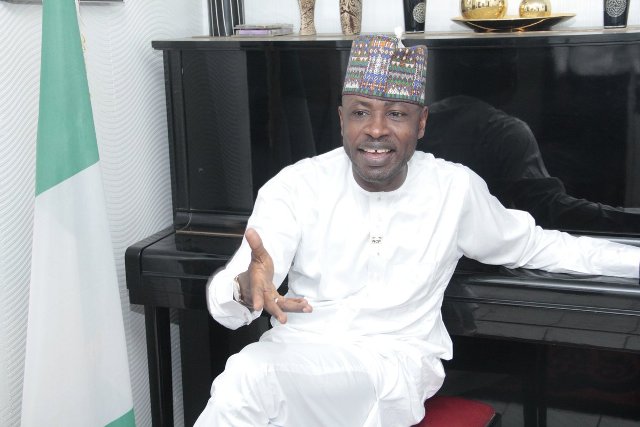Insecurity which was once thought to be the peculiar ordeal of one region has engulfed every geo-political zone and virtually every state in Nigeria, mutating along the way and presenting different variants that defy all previously known solutions.
This was the view of analysts at ‘A day with the parish priest’ organised the Catholic Men Organisation of Nigeria (CMO) of St. Leo’s Catholic Church, Ikeja, Lagos.
Held under the theme: ‘Insecurity in Nigeria: Implications for ethnic and religious harmony’, the event was moderated by Mrs. Chinyelu Anyiam-Osigwe and chaired by Mrs. Nkechi Ali-Balogun.
The panelists were Mr. Adetayo Oluwaseyi, retired employee of the Department of State Services (DSS) and former senior security detail to President Olusegun Obasanjo; Lagos based legal practitioner and public affairs analyst, Dr. Chima Nnaji and chairman of the National Conscience Party (NCP), Dr Tanko Yunusa.
They stated that security challenges plaguing the country manifest itself the form of Boko Haram terrorists that carry out atrocious attacks on civilian population, public infrastructure and military establishments in the northeast; bandits that operate in the northwest and kidnap and receive hefty ransom which they use to buy more dangerous weapons to execute their nefarious activities; murderous herdsmen who lurk around forests in the southwest, south-south, and southeast destroying farmlands, killing, maiming and raping in the process and the proscribed Indigenous People of Biafra (IPOB) that champions the cause of the Igbo in the southeast.
They blamed successive administrations since the return of civil rule in 1999 for not tackling the problem headlong.
Oluwaseyi contended that the Boko Haram insurgent was the result of the inaction of governments in the past to pay attention to a growing number of extremists who participated in wars and underwent training in Afghanistan, Iran, Sudan and Algeria and thereafter returned home and recruited followers.
“In my interactions with commanders of Boko Haram and leaders of bandits over the years, a recurring agitation noticed among them is their exclusion by political leaders who rode on their back to power.
“Our leaders play the ethnic and religious cards to perpetuate their grip on power and then abandon them once they get into office.
“Ideologies are part of the problem fanning crisis in the country. We have made several mistakes and kept quiet,” he said.
He said Nigeria does not have the military to fight the myriad of security challenges in the country and urged the government reduce the areas of discontentment.
‘The president must start the restructuring of Nigeria in order to douse the tension and agitation in different parts of the country.
“We need to start massive recruitment into the military for emergency military service as a way of creating employment for jobless youths.”
On insecurity in the southeast, Oluwaseyi attributed the problem to those he described as “political titans” who, according to him “are pursuing their personal interests.”
“We do not need to buy Tucano jets to fight the citizens; all we need is action to address issues confronting us,” he stressed.
For his part, Nnaji attributed the crisis in Nigeria partly to the born-to-rule philosophy of a section of the country.
He said crisis will not abate as long as some persons or a section of the country continues to dominate the rest.
He submitted that the citizens need liberation of the mind and urge Nigerians to shun politicians who deploy extreme ideology for political patronage.
He also said religion and ethnicity are raw materials for the perpetrators of such act.
In his contribution, Yunusa said the country’s leaders should tender unreserved apologies to the citizens for using religion and ethnicity for political advantage.
He charged the electorate to choose leaders who are thinkers and in tune with the global realities.
He said majority of the current leaders are bereft ideas to govern a country in the 21st century.
In her remarks, Ali-Balogun said ethnicity and religion override class politics and national interest.
“Nigeria has over 250 ethnic groups with a complex coloration and admixture. One of those colorations is religion. Religious affiliation is linked to Nigeria’s ethnic diversity,” she said.
She also made a case for women participation in peacemaking processes.
“Where a nation ignores its women in the decision-making processes, there will be problems. Women can help de-programme the minds of the terrorists, the bandits and kidnappers as mothers.
“We must go back to the drawing table to include women. We also need to include our youths. We need a revolution in our court processes, and all. We must change to a new narrative,” he added.
In his contribution, the CMO chairman, Mr. Maurice Offiong said the security problems in the country call for urgent attention and drastic actions from all as it is the masses that cut across all ethnic and religious boundaries that near the brunt of the problem.
One of the highlights of the annual meet was health talk on prostate cancer.
Some non-governmental organisations provide free prostate screening and some other vital checks for all interested persons.



























































